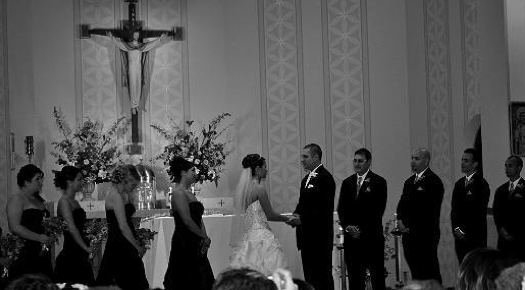
Marriage in the Catholic Church is the "covenant by which a man and a woman establish between themselves a partnership of the whole of life and which is ordered by its nature to the good of the spouses and the procreation and education of offspring", and which "has been raised by Christ the Lord to the dignity of a sacrament between the baptized."
As Spain grows more secular, fewer weddings are performed in church. According to The Olive Press, 22.2 percent in the first half of 2016 is a huge fall from the same period in the year 2000, when 75 percent of couples had a Catholic ceremony.
Barcelona province had the lowest number of Christian ceremonies in mainland Spain, at only 10.5 percent. Malaga saw the least in Andalucia, with 21.6 percent. However, neighbouring Jaen had the highest in the country, at 53 percent.
Alfonso Pérez-Agote, a sociologist, says three main reasons explain the nosedive in Catholic weddings. These are the impact of the economic crisis, which has left 34.4 percent of under 30s unemployed, and a change in cultural views, which means marriage is not seen as important. He added that growing secularization also played a part.
"The young people of today are the children of those disinterested in religion. When they think of getting married, they don’t think of doing so in the church.”
This quote demonstrates that religious belief can be seen as nurture rather than nature. If less religious belief is instilled in the future generation, it will less care about religion.
More than half of Spaniards admit that they are either "not religious" or are "convinced atheists", according to a global study from 2015. Actually, 35 percent said they were “not religious” and 20 percent went even further and declared that they were "convinced atheists".
Roman Catholicism has long been the main religion of Spain, and although it no longer has official status by law, in all public schools in Spain students have to choose either a religion or ethics class. Known as a bastion of Roman Catholicism, Spain was responsible for the Inquisition and the birth of orders including the Dominicans, the Jesuits and Opus Dei, but the religion has been on the wane since the death of Dictator General Francisco Franco in 1975.
The last Pope, Benedict XVI, saw Spain as one of the principal nations ripe for evangelism and he visited the country three times in his eight years as pontiff. But the number of churchgoers has continued to fall.
According to the survey, only China (61 percent), Hong Kong (34 percent), Japan (31 percent) and the Czech Republic (30 percent) registered more "convinced atheists" that Spain.
Photo Credits: Wikimedia
